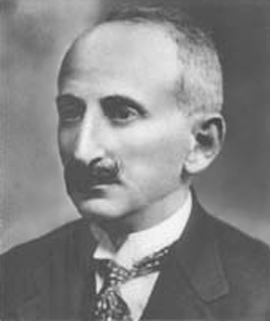|
Bolesław Leśmian
Bolesław Leśmian (born Bolesław Lesman; January 22, 1877The exact date of his birth is disputed: the act of birth mentions 1877, Leśmian himself used 1878, while the date mentioned on his tombstone is 1879. – November 5, 1937) was a Polish poet, artist and member of the Polish Academy of Literature, one of the first poets to introduce Symbolism and Expressionism to Polish verse. Though largely a marginal figure during his lifetime, Leśmian is now considered one of Poland's greatest poets. He is, however, little known outside of his home country, mostly on account of his neologisms-rich idiosyncratic style, dubbed "almost untranslatable" by Czesław Miłosz and "the ultimate and overwhelming proof for the untranslatability of poetry" by noted Polish Shakespearean translator, Stanisław Barańczak. Biography Bolesław Leśmian was born January 22, 1877, in Warsaw, Congress Poland, Russian Empire to a family of Polonized Jewish intelligentsia. He spent his childhood an ... [...More Info...] [...Related Items...] OR: [Wikipedia] [Google] [Baidu] |
Bolesław Leśmian Portret - Dziejba Leśna
Boleslav or Bolesław may refer to: In people: * Boleslaw (given name) In geography: * Bolesław, Dąbrowa County, Lesser Poland Voivodeship, Poland * Bolesław, Olkusz County, Lesser Poland Voivodeship, Poland * Bolesław, Silesian Voivodeship, Poland *Brandýs nad Labem-Stará Boleslav, Czech Republic *Mladá Boleslav, Czech Republic See also * Pulß * Václav (other) * Wenceslaus (other) Wenceslaus, Wenceslas, Wenzeslaus and Wenzslaus (and other similar names) are Latinized forms of the Czech name Václav. The other language versions of the name are german: Wenzel, pl, Wacław, Więcesław, Wieńczysław, es, Wenceslao, russian: ... {{disambig, geo de:Bolesław ... [...More Info...] [...Related Items...] OR: [Wikipedia] [Google] [Baidu] |
Polish Jews
The history of the Jews in Poland dates back at least 1,000 years. For centuries, Poland was home to the largest and most significant Ashkenazi Jewish community in the world. Poland was a principal center of Jewish culture, because of the long period of statutory religious tolerance and social autonomy which ended after the Partitions of Poland in the 18th century. During World War II there was a nearly complete genocidal destruction of the Polish Jewish community by Nazi Germany and its collaborators of various nationalities, during the German occupation of Poland between 1939 and 1945, called the Holocaust. Since the fall of communism in Poland, there has been a renewed interest in Jewish culture, featuring an annual Jewish Culture Festival, new study programs at Polish secondary schools and universities, and the opening of Warsaw's Museum of the History of Polish Jews. From the founding of the Kingdom of Poland in 1025 until the early years of the Polish–Lithuanian Comm ... [...More Info...] [...Related Items...] OR: [Wikipedia] [Google] [Baidu] |
Denis Hills
Denis Cecil Hills (8 November 1913 – 26 April 2004) was a British author, teacher, traveller and adventurer. He came to international prominence in 1975 while he was living in Uganda and was sentenced to death for espionage and sedition following comments about President Idi Amin in a book which Hills wrote. After Amin rebuffed appeals for clemency by Queen Elizabeth, Hills was released and allowed to return to the UK following the intervention of the British government. Biography Hills was born in the Birmingham suburb of Moseley. He attended King Edward's School, Birmingham before going on to Oxford University in 1932 where he read Philosophy, Politics and Economics at Lincoln College. In 1935, he left Oxford to travel through Germany, funding himself by writing for the '' Birmingham Post''. Returning to England, Hills worked briefly at Shell-Mex & BP before moving to Poland in 1937 as English editor of a cultural magazine. Hills' book ''Return to Poland'' showed his fas ... [...More Info...] [...Related Items...] OR: [Wikipedia] [Google] [Baidu] |
Zamość
Zamość (; yi, זאמאשטש, Zamoshtsh; la, Zamoscia) is a historical city in southeastern Poland. It is situated in the southern part of Lublin Voivodeship, about from Lublin, from Warsaw. In 2021, the population of Zamość was 62,021. Zamość was founded in 1580 by Jan Zamoyski, Grand Chancellor of Poland, who envisioned an ideal city. The historical centre of Zamość was added to the World Heritage List in 1992, following a decision of the sixteenth ordinary session of the World Heritage Committee, held between 7 and 14 December 1992 in Santa Fe, New Mexico, United States; it was recognized for being "a unique example of a Renaissance town in Central Europe". Zamość is about from the Roztocze National Park. History Zamość was founded in 1580 by the Chancellor and Hetman (head of the army of the Polish–Lithuanian Commonwealth), Jan Zamoyski, on the trade route linking western and northern Europe with the Black Sea. Modelled on Italian trading cities, and b ... [...More Info...] [...Related Items...] OR: [Wikipedia] [Google] [Baidu] |

